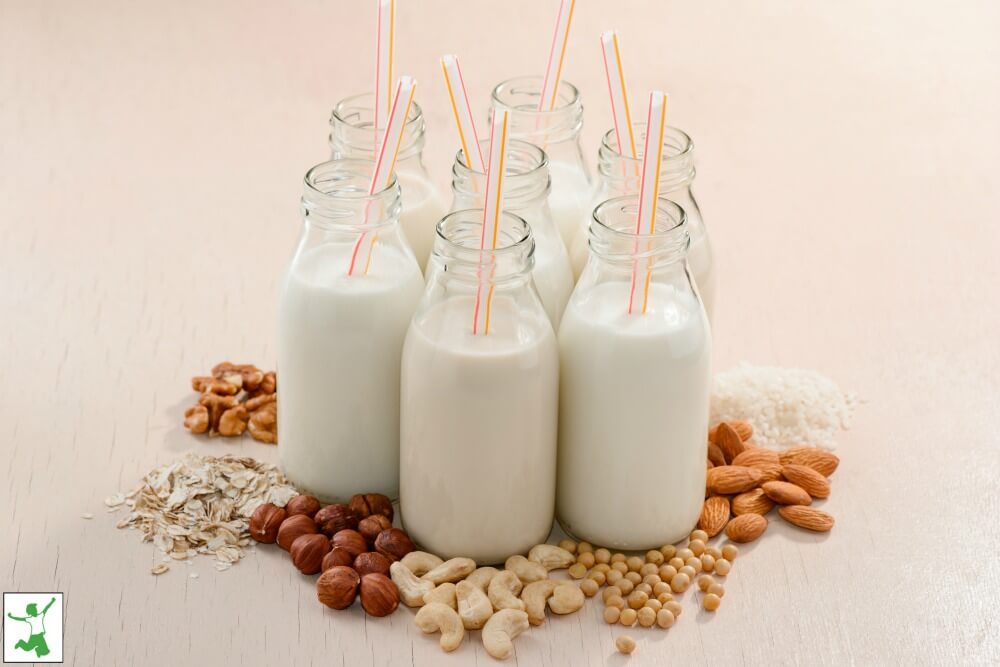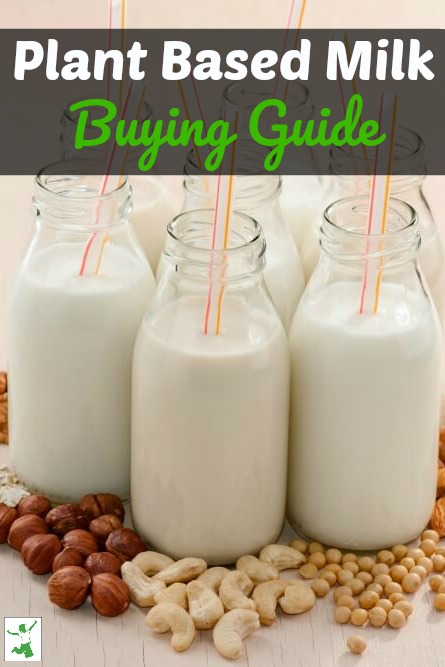 Have you noticed that plant-based milk seems to be everywhere in both supermarkets and health food stores? In some places, the alternative milk brands on offer exceed those for dairy!
Have you noticed that plant-based milk seems to be everywhere in both supermarkets and health food stores? In some places, the alternative milk brands on offer exceed those for dairy!
Is any of this stuff good for you or your kids? What things should you be looking for if you are unable to tolerate dairy milk and want to use it in your home?
What is Plant-Based Milk?
Plant-based milk is a very loosely defined term within the beverage industry. It is so loose, in fact, that the dairy industry has petitioned the FDA to not allow plant-based beverages to be called “milk” at all. The Iowa Farm Bureau Federation (IFBF) describes it this way:
The number of plant-based products using dairy names on the label has increased dramatically in recent years. … The lack of FDA action has led to an anything goes mentality in the marketplace. (1)
Essentially then, vegan milk is any whitish liquid that can be used as a substitute for dairy milk. Mileage varies greatly from brand to brand. In some cases, a particular cow milk alternative may not mimic the nutrients in real milk at all!
The most popular ones I’ve come across regularly include:
- Coconut milk
- Rice milk
- Almond milk
- Cashew milk
- Oat milk
- Soy milk
- Pea milk
Some brands contain a blend of different plant proteins to make their “milk”. Suja, for example, uses pea protein, sunflower seed butter, and flax seeds. Others contain a blend of soy and rice and so forth.
Why So Many Brands?
The reasons for this market explosion are two-fold.
First, more people are realizing that they simply cannot tolerate commercially processed dairy.
The high heat processing is in many cases to ultrapasteurization (UHT) temperature (135 °C / 275 °F), which is significantly higher than the boiling point of water (100 °C / 212 °F).
Applying this high level of heat for 2-5 seconds denatures the milk proteins completely and renders them allergenic. Of course, all the enzymes are destroyed as well .. most notably lactase, necessary for digesting the lactose.
In other words, unless you have an iron stomach, good luck digesting that stuff!
Organic milk is the worst of the bunch, in fact, and more likely to be UHT processed!
Most of the dairy sensitive people I know don’t do much better on minimally processed, vat pasteurized, non-homogenized milk either.
The second reason for the growing popularity of cow milk alternatives is public perception – myth though it is – that eating mostly or only plants is the way to optimal health.
Should You Be Drinking Plant-Based Milk?
First, let me make it clear that I have nothing against plant-based milk!
They are an important and necessary beverage option given the significant number of people today who have a genuine dairy allergy or no access to easily digestible, clean raw grass-fed milk.
Hence, quality dairy substitutes fill a much-needed gap because commercially processed dairy is so problematic in the diet.
The real question, then, is whether commercial plant-based milk brands are safe to drink.
Based on my research, if you choose to drink a milk substitute, you really MUST make it yourself (this article contains several plant-based milk recipes to try).
The commercial offerings are just too dangerous to consume on a regular basis. Here’s why.
4 Reasons Commercial Brands are Unsafe
The first reason to skip commercial plant-based milk brands is to avoid synthetic vitamins. The worst of these are Vitamin A palmitate and Vitamin D2 (vegan Vitamin D).
The Organic Consumers Association warns that isolated vitamins such as those produced synthetically and used in supplements or added to foods cannot be recognized or metabolized by the body in the same way as natural versions. When fat soluble like synthetic A/D, they have the potential to build-up in the body and create a toxic situation. (2)
The second reason to avoid commercial milk substitutes is because of the additives. Manufacturers commonly add gums like guar and gellen among others as well as other substances to give the beverage body and a milk-like consistency. However, they are not a good idea to consume on a regular basis.
Note: Some of these additives like carrageenan are allowed in organic brands too!
The third reason to skip alternative dairy from the store is the added sugar. Most brands I’ve inspected contain 8 or more grams of sweetener per serving. There are some options that are low in sugar or completely unsweetened, but ultimately, these are best avoided too because of the fourth and final reason.
The Dirty Little Secret about Commercial Milk Substitutes
Let’s suppose you’ve done your homework and found a plant-based milk brand that has no added sugar, additives or synthetic vitamins.
While that is great and certainly better than the vast majority of options out here, I would encourage you to still not buy it!
Why?
You see, the biggest reason of all to avoid any and all plant-based milk brands is the packaging.
The dirty little secret of alternative milk is that the liquid is boiling hot when it is poured into those tetrapaks or plastic bottles and then sealed.
While necessary to ensure a completely sterile environment that is free of pathogenic microbes when the consumer opens it at home, this factory protocol creates another problem – the very real danger of leaching hormone-disrupting chemicals from the plastic.
Tetrapaks are no safer than plastic bottles either. These shelf stable alternative milk cartons are lined with plastic!
Incidentally, this leaching problem extends to all tetrapak foods — including commercially made bone broth!
The health dangers of boiling hot liquid coming into contact with plastic and remaining there for many minutes while the liquid cools down isn’t usually recognized by consumers. The reason is that by the time they buy it, the containers are either on a shelf or even more misleading, in the refrigerated section of the dairy aisle.
It’s not just about the food … the packaging must be considered as well to determine whether a product is safe to consume or not.
 Safe Options for Alternative Milk
Safe Options for Alternative Milk
In sum, if you are in need of plant-based milk alternatives, it is worth your time to make it yourself! Here are a few recipes on this blog to get you started:
Note that while these beverages are healthy for older children and adults, they should never be used to make vegan baby formula.
Hopefully, one or more beverage companies will step up and market plant-based milk that is unsweetened, free of additives and synthetic vitamins and packaged in glass.
Another safe option is for food manufacturers to use cold press technology to sterilize alternative milk instead of heat, then package, and ship refrigerated if using non-glass containers. Of course, the shelf life may be reduced this way and the costs of production and delivery are much greater. Shipping frozen and keeping frozen at the store would likely be a more practical solution as shelf life would be months instead of days.
Until one or more of these commercial options emerge, do your body a favor and make it yourself!
If you’ve found one already in some corner of the world (I haven’t seen one yet), please let us know in the comments!
References
(1) FDA Asked to Prevent Misleading Labels in the Dairy Aisle
(2) Nutri-Con: The Truth about Vitamins and Supplements








Hi Sarah! Do you have a recipe for making cashew milk? We recently learned that my son is allergic to dairy, oats, and almonds, among other things. He’s having a hard time giving up all milk products. So I’m wondering what you think about cashew milk.
Have you tried raw milk? Most children can tolerate it just fine.
What an interesting article, thank you. I especially found the information regarding the tetra packs very interesting. I suppose they must do the same for all liquid being sold in tetra cartons? Soup, orange juice etc?
Yes, the danger is the same for ALL tetra cartons. Totally toxic packaging. Stay away!
Have you done something on detox of microorganisms?
I am wondering about coconut milk that is packaged in BPA free cans. Would that be safer? Native Forest makes one without any added guar gum.
That is ok.
I have been using ripple milk (pea protein) for the past year because it’s the only thing that comes closes to cows In terms of nutrients. Are you familiar with they process, since all of the containers are bpa free.
It’s not cold pressed from what I’ve seen, so the liquid is boiling hot when packaged. Even if the bottle is bpa free, it almost certainly uses a lookalike chemical with similar issues like bps.
Plastic is NEVER safe when heated and in contact with food.
Hi Sarah, would you regard the presence of antinutrients (as most base ingredients aren’t sprouted) a fifth reason not to buy commercial plant-based milk?
That is a good point for some brands, but other plant based milks aren’t from sources that have much in the way of antinutrients such as coconut milk. Also, almond milk is typically made with skinless almonds, so a large portion of the antinutrients are no longer present by the time the “milk” is made.
Actress Jennifer Garner was on Dr., Oz she talked about a products for babies called (once upon a farm)
that is Organic and Healthy.
What is the packaging process? Organic certification does not protect from packaging toxins.
I have been using cashew milk (I’ve used Elmhurst but can’t find it in Arizona where I just moved and instead have found a brand called Malk which is just filtered cashews and water) but it’s in a plastic bottle in the refrigerated section.
I am a busy working mom of 2 young boys and a traveling husband… making it sounds good in theory, but hard. Would you recommend instead that I buy raw milk which is legally sold in AZ! I use milk in my coffee and smoothies. Thanks for your opinion!
If you tolerate milk well, then yes, raw grassfed milk would be the best choice by far!
I found a product called the Almond Cow which you can prepare the nut milks in. I’ve considered purchasing one to save time. It’s pricey but says that it’s cold extracting.
I’m still making hemp milk. Hemp seeds and water only.. it’s great for homemade granola but not for anything else.
Thats very helpful information, I was wondering how good oat milk was, and I’m looking for a safe recipe if you know of one.
I’m looking into it! Oats are very very high in phytic acid … I haven’t found a recipe yet that removes this problem first before the milk is made.